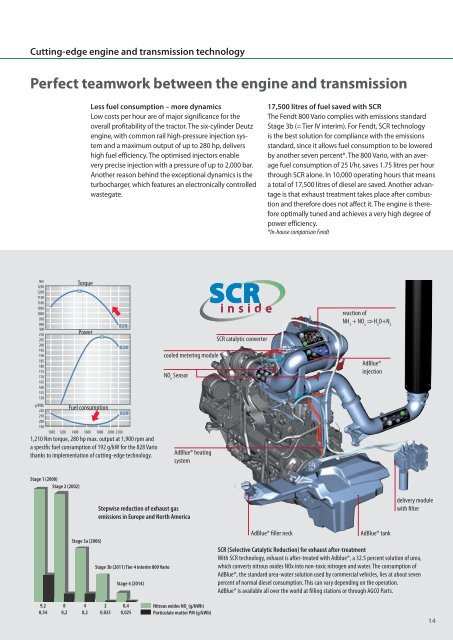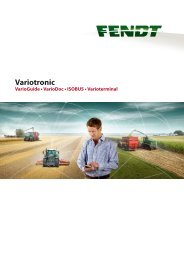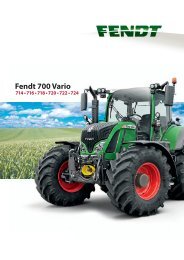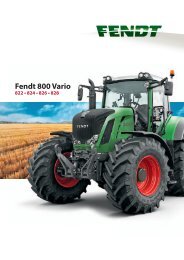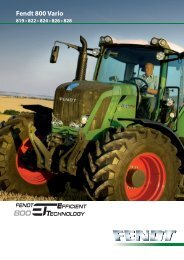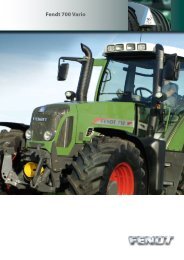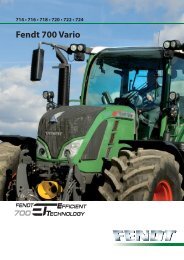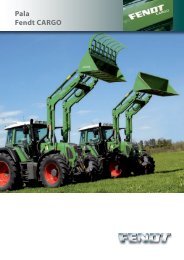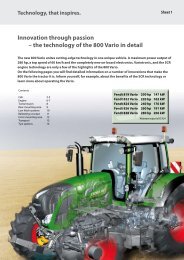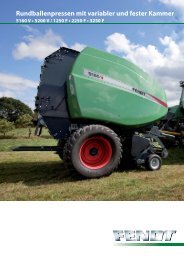819 • 822 • 824 • 826 • 828 - Fendt
819 • 822 • 824 • 826 • 828 - Fendt
819 • 822 • 824 • 826 • 828 - Fendt
Create successful ePaper yourself
Turn your PDF publications into a flip-book with our unique Google optimized e-Paper software.
Cutting-edge engine and transmission technology<br />
Perfect teamwork between the engine and transmission<br />
Nm<br />
1250<br />
1200<br />
1150<br />
1100<br />
1050<br />
1000<br />
950<br />
900<br />
kW<br />
210<br />
205<br />
200<br />
195<br />
190<br />
185<br />
180<br />
175<br />
170<br />
165<br />
160<br />
155<br />
150<br />
g/kWh<br />
220<br />
210<br />
200<br />
190<br />
<strong>828</strong><br />
<strong>828</strong><br />
1000 1200 1400 1600 1800 2000 2100<br />
Stage 1 (2000)<br />
Stage 2 (2002)<br />
Torque<br />
Power<br />
Fuel consumption<br />
<strong>828</strong><br />
9,2 8 4 2 0,4<br />
0,54 0,2 0,2 0,025 0,025<br />
Less fuel consumption – more dynamics<br />
Low costs per hour are of major significance for the<br />
overall profitability of the tractor. The six-cylinder Deutz<br />
engine, with common rail high-pressure injection system<br />
and a maximum output of up to 280 hp, delivers<br />
high fuel efficiency. The optimised injectors enable<br />
very precise injection with a pressure of up to 2,000 bar.<br />
Another reason behind the exceptional dynamics is the<br />
turbocharger, which features an electronically controlled<br />
wastegate.<br />
1,210 Nm torque, 280 hp max. output at 1,900 rpm and<br />
a specific fuel consumption of 192 g/kW for the <strong>828</strong> Vario<br />
thanks to implementation of cutting-edge technology.<br />
Stage 3a (2006)<br />
Stepwise reduction of exhaust gas<br />
emissions in Europe and North America<br />
Stage 3b (2011) Tier 4 interim 800 Vario<br />
Stage 4 (2014)<br />
cooled metering module<br />
NO x Sensor<br />
AdBlue® heating<br />
system<br />
Nitrous oxides NO x (g/kWh)<br />
Particulate matter PM (g/kWh)<br />
SCR catalytic converter<br />
17,500 litres of fuel saved with SCR<br />
The <strong>Fendt</strong> 800 Vario complies with emissions standard<br />
Stage 3b (= Tier IV interim). For <strong>Fendt</strong>, SCR technology<br />
is the best solution for compliance with the emissions<br />
standard, since it allows fuel consumption to be lowered<br />
by another seven percent*. The 800 Vario, with an average<br />
fuel consumption of 25 l/hr, saves 1.75 litres per hour<br />
through SCR alone. In 10,000 operating hours that means<br />
a total of 17,500 litres of diesel are saved. Another advantage<br />
is that exhaust treatment takes place after combustion<br />
and therefore does not affect it. The engine is therefore<br />
optimally tuned and achieves a very high degree of<br />
power efficiency.<br />
*In-house comparison <strong>Fendt</strong><br />
AdBlue® filler neck<br />
reaction of<br />
NH 3 + NO x => H 2 O+N 2<br />
AdBlue®<br />
injection<br />
AdBlue® tank<br />
delivery module<br />
with filter<br />
SCR (Selective Catalytic Reduction) for exhaust after-treatment<br />
With SCR technology, exhaust is after-treated with Adblue®, a 32.5 percent solution of urea,<br />
which converts nitrous oxides NOx into non-toxic nitrogen and water. The consumption of<br />
AdBlue®, the standard urea-water solution used by commercial vehicles, lies at about seven<br />
percent of normal diesel consumption. This can vary depending on the operation.<br />
AdBlue® is available all over the world at filling stations or through AGCO Parts.<br />
14


